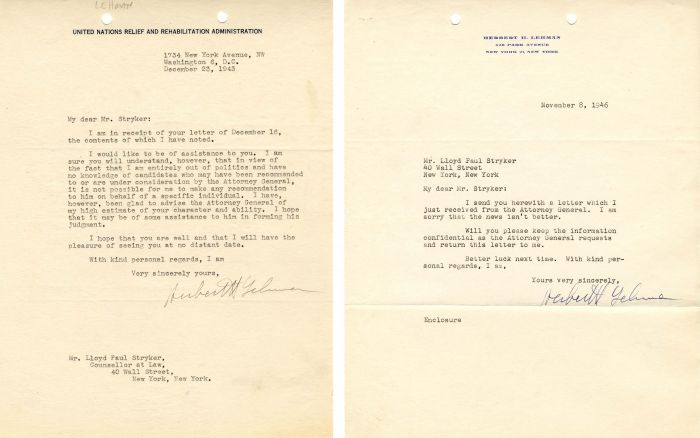Pair of letters signed by Herbert H. Lehman
Inv# AU1432
Pair of typed letters signed by Herbert H. Lehman.

Herbert Henry Lehman (March 28, 1878 – December 5, 1963) was a Democratic Party politician from New York. He served from 1933 until 1942 as the 45th Governor of New York and represented New York State in the U.S. Senate from 1949 until 1957. He was born to a Reform Jewish family in Manhattan, New York City, the son of Babetta (née Newgass) and German-born immigrant Mayer Lehman, one of the three brothers who co-founded Lehman Brothers financial services firm. Herbert's father arrived from Rimpar, Germany, in 1848, settling in Montgomery, Alabama, where he engaged in the slave-era cotton business. As cotton was the most important crop of the Southern United States and global demand led to profitable business, the Lehman brothers became cotton factors, accepting cotton bales from customers as payment for their merchandise. Cotton trading eventually became the main thrust of their business. In 1867, Mayer and Emanuel moved the company's headquarters to New York City, and helped found the New York Cotton Exchange. He attended The Sachs School, founded by Julius Sachs. In 1895, he graduated from Sachs Collegiate Institute in New York City, and in 1899, he graduated with a B.A. from Williams College. After college, Lehman worked in textile manufacturing, eventually becoming vice-president and treasurer of the J. Spencer Turner Company in Brooklyn. In 1908, he became a partner in the investment banking firm Lehman Brothers of New York City with his brother Arthur and cousin Philip. During World War I, he became a colonel on the U.S. Army general staff. By 1928, when he entered public service, he had withdrawn entirely from business. Lehman became active in politics in 1920 and became chairman of the finance committee of the Democratic Party in 1928 as a reward for having been a strong supporter of Alfred E. Smith. He was elected lieutenant governor of New York in 1928 and 1930 and resigned from Lehman Brothers upon taking office. He then served four terms as Governor of New York, elected in 1932 to replace Franklin D. Roosevelt (who had been running for president), and re-elected in 1934, 1936 and 1938. Unlike Smith, Lehman was a supporter of Roosevelt's New Deal and implemented a similar program in New York. On December 3, 1942, he resigned the governorship less than a month before the end of his term, to accept an appointment as director of foreign relief and rehabilitation operations for the US Department of State. He served as director-general of the United Nations Relief and Rehabilitation Administration from 1943 to 1946. Lehman was the Democratic nominee for US Senator from New York in 1946 and also ran on the Liberal and American Labor tickets but was defeated by the Republican candidate, Irving Ives. In 1949, he ran again, this time in a special election to serve the remainder of Robert F. Wagner's term. Lehman defeated John Foster Dulles, who had been appointed to temporarily fill the vacancy after Wagner's resignation, and he took his seat on January 3, 1950. In the campaign, he ran on the Democratic and Liberal tickets, with the American Labor Party urging their members not to vote for any candidate. In 1950, Lehman was re-elected to a full term, running on Democratic and Liberal lines and opposed by the American Labor Party. Lehman was one of two US senators who were opposed to nominating Mississippi Senator James O. Eastland to be chairman of the Senate Judiciary Committee. (The other was Wayne Morse of Oregon.) He was also an early and vocal opponent of Senator Joseph McCarthy (R-Wis.). Lehman was one of the most liberal senators and was therefore not considered part of the Senate's "club" of insiders. He retired from the Senate after his full term and was not a candidate for renomination or re-election in 1956. After his retirement from the Senate, Lehman remained politically active, working with Eleanor Roosevelt and Thomas K. Finletter in the late 1950s and early 1960s to support the reform Democratic movement in Manhattan that eventually defeated longtime Tammany Hall boss Carmine DeSapio. He also helped to found the Lehman Children's Zoo (now the Tisch Zoo) in Central Park. Lehman was the first, and until the 2007 inauguration of Eliot Spitzer, the only Jewish governor of New York. During much of his Senate career, he was the only Jewish Senator as well. Unlike most of his Jewish constituents, who had immigrated to the US from eastern Europe, Lehman's family was from Germany. Lehman spent much of the last two years of his life at his New York City home. He celebrated his 85th birthday in March 1963 in increasingly poor health and died of heart failure on December 5, 1963, at age 85. Lehman is interred at Kensico Cemetery in Valhalla, New York.










Ebay ID: labarre_galleries